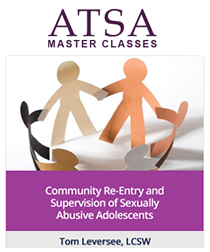
Tom Leversee, LCSW has conducted extensive trainings focused on sexually abusive adolescents and delinquent youth throughout the United States, as well as in the Virgin Islands and Canada. Tom is available for trainings and speaking engagements. Please email or call for more information. Training is tailored to meet the specific needs of the agency or organization and may range from a brief workshop to several days.
 ATSA Master Class: Community Re-Entry and Supervision of Sexually Abusive Adolescents – ATSA (atsa-training.com)
ATSA Master Class: Community Re-Entry and Supervision of Sexually Abusive Adolescents – ATSA (atsa-training.com)
This ATSA Master Class presents content relevant to adolescents being paroled or stepping-down from youth corrections facilities as well as youth under the jurisdiction of probation and/or human services who are transitioning from residential programs into the community. Read More →
Trainings Offered Include but are not Limited to:
Understanding and Applying Typology Research to the Treatment and Supervision of Juveniles who have Committed Sexual Offenses
Providing individualized treatment and supervision to sexually abusive youth requires knowledge regarding the diversity that exists among this population. Typology research provides important information for clinical intervention by identifying key constructs for assessment, possible etiological factors specific to each subtype of juvenile, and unique risk and needs for each subtype that should be targeted in treatment and supervision (Faniff & Kolko, 2012; Leversee, 2007, 2008, 2011, 2011).
Beyond Risk Management to a More Holistic Model for Treating Sexually Abusive Youth
The juvenile sexual offending field is evolving from the narrow, specialized treatment model of the past. A narrow risk reduction/risk management framework is not sufficient to address the diverse developmental and dynamic factors associated with juvenile sexual offending and other conduct problems and fails to adequately consider the dynamic and transactional nature of adolescent development (Leversee & Powell, 2012). This training provides a framework and practical application plan for the integration of risk reduction with health promotion into a holistic model.
Evaluation and Ongoing Assessment of Juveniles who have Committed Sexual Offenses
A developmental/contextual framework for the evaluation and ongoing assessment of juveniles who have committed sexual offenses is consistent with the dynamic and transactional nature of adolescent development. This training identifies the core correctional principles that drive evaluation and treatment planning, provides an overview of evaluation methodology and protocols, and discusses guidelines for interviewing. The areas to be addressed in an evaluation are covered in depth with an emphasis on what are we looking for and why is it important in conceptualizing the case, assessing risk, and formulating treatment and supervision plans (Leversee, 2010).
Research and Literature Updates in the Evaluation and Treatment of Juveniles who have Committed Sexual Offenses
Intervening with juveniles who have committed sexual offenses is a dynamic and evolving field. Individual practitioners, agencies, and systems are challenged to design and implement programming that is consistent with research and best practice. This training will be tailored to meet the needs of the agency or organization. Research that has important implications for treatment and supervision planning include etiology, empirically supported, static and dynamic risk factors, differential treatment and supervision needs, and effective interventions.